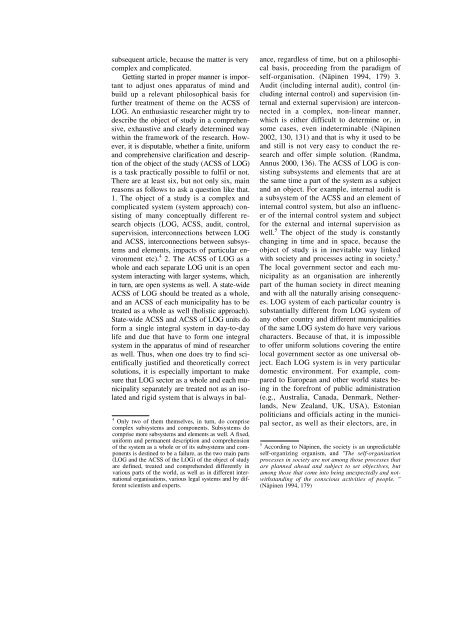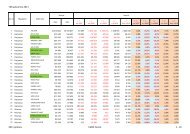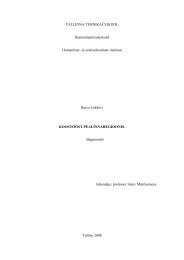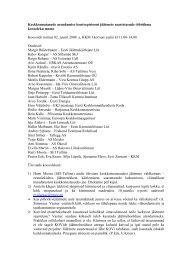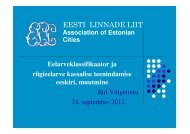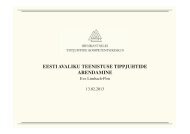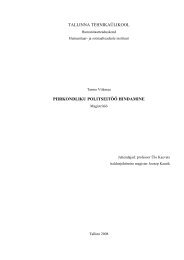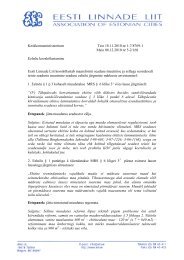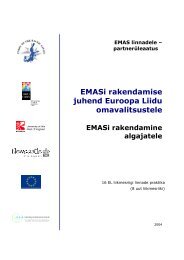Theoretical and Practical Problems Related to the Audit, Control and ...
Theoretical and Practical Problems Related to the Audit, Control and ...
Theoretical and Practical Problems Related to the Audit, Control and ...
Create successful ePaper yourself
Turn your PDF publications into a flip-book with our unique Google optimized e-Paper software.
subsequent article, because <strong>the</strong> matter is very<br />
complex <strong>and</strong> complicated.<br />
Getting started in proper manner is important<br />
<strong>to</strong> adjust ones apparatus of mind <strong>and</strong><br />
build up a relevant philosophical basis for<br />
fur<strong>the</strong>r treatment of <strong>the</strong>me on <strong>the</strong> ACSS of<br />
LOG. An enthusiastic researcher might try <strong>to</strong><br />
describe <strong>the</strong> object of study in a comprehensive,<br />
exhaustive <strong>and</strong> clearly determined way<br />
within <strong>the</strong> framework of <strong>the</strong> research. However,<br />
it is disputable, whe<strong>the</strong>r a finite, uniform<br />
<strong>and</strong> comprehensive clarification <strong>and</strong> description<br />
of <strong>the</strong> object of <strong>the</strong> study (ACSS of LOG)<br />
is a task practically possible <strong>to</strong> fulfil or not.<br />
There are at least six, but not only six, main<br />
reasons as follows <strong>to</strong> ask a question like that.<br />
1. The object of a study is a complex <strong>and</strong><br />
complicated system (system approach) consisting<br />
of many conceptually different research<br />
objects (LOG, ACSS, audit, control,<br />
supervision, interconnections between LOG<br />
<strong>and</strong> ACSS, interconnections between subsystems<br />
<strong>and</strong> elements, impacts of particular environment<br />
etc). 4 2. The ACSS of LOG as a<br />
whole <strong>and</strong> each separate LOG unit is an open<br />
system interacting with larger systems, which,<br />
in turn, are open systems as well. A state-wide<br />
ACSS of LOG should be treated as a whole,<br />
<strong>and</strong> an ACSS of each municipality has <strong>to</strong> be<br />
treated as a whole as well (holistic approach).<br />
State-wide ACSS <strong>and</strong> ACSS of LOG units do<br />
form a single integral system in day-<strong>to</strong>-day<br />
life <strong>and</strong> due that have <strong>to</strong> form one integral<br />
system in <strong>the</strong> apparatus of mind of researcher<br />
as well. Thus, when one does try <strong>to</strong> find scientifically<br />
justified <strong>and</strong> <strong>the</strong>oretically correct<br />
solutions, it is especially important <strong>to</strong> make<br />
sure that LOG sec<strong>to</strong>r as a whole <strong>and</strong> each municipality<br />
separately are treated not as an isolated<br />
<strong>and</strong> rigid system that is always in bal-<br />
4 Only two of <strong>the</strong>m <strong>the</strong>mselves, in turn, do comprise<br />
complex subsystems <strong>and</strong> components. Subsystems do<br />
comprise more subsystems <strong>and</strong> elements as well. A fixed,<br />
uniform <strong>and</strong> permanent description <strong>and</strong> comprehension<br />
of <strong>the</strong> system as a whole or of its subsystems <strong>and</strong> components<br />
is destined <strong>to</strong> be a failure, as <strong>the</strong> two main parts<br />
(LOG <strong>and</strong> <strong>the</strong> ACSS of <strong>the</strong> LOG) of <strong>the</strong> object of study<br />
are defined, treated <strong>and</strong> comprehended differently in<br />
various parts of <strong>the</strong> world, as well as in different international<br />
organisations, various legal systems <strong>and</strong> by different<br />
scientists <strong>and</strong> experts.<br />
ance, regardless of time, but on a philosophical<br />
basis, proceeding from <strong>the</strong> paradigm of<br />
self-organisation. (Näpinen 1994, 179) 3.<br />
<strong>Audit</strong> (including internal audit), control (including<br />
internal control) <strong>and</strong> supervision (internal<br />
<strong>and</strong> external supervision) are interconnected<br />
in a complex, non-linear manner,<br />
which is ei<strong>the</strong>r difficult <strong>to</strong> determine or, in<br />
some cases, even indeterminable (Näpinen<br />
2002, 130, 131) <strong>and</strong> that is why it used <strong>to</strong> be<br />
<strong>and</strong> still is not very easy <strong>to</strong> conduct <strong>the</strong> research<br />
<strong>and</strong> offer simple solution. (R<strong>and</strong>ma,<br />
Annus 2000, 136). The ACSS of LOG is consisting<br />
subsystems <strong>and</strong> elements that are at<br />
<strong>the</strong> same time a part of <strong>the</strong> system as a subject<br />
<strong>and</strong> an object. For example, internal audit is<br />
a subsystem of <strong>the</strong> ACSS <strong>and</strong> an element of<br />
internal control system, but also an influencer<br />
of <strong>the</strong> internal control system <strong>and</strong> subject<br />
for <strong>the</strong> external <strong>and</strong> internal supervision as<br />
well. 5 The object of <strong>the</strong> study is constantly<br />
changing in time <strong>and</strong> in space, because <strong>the</strong><br />
object of study is in inevitable way linked<br />
with society <strong>and</strong> processes acting in society. 5<br />
The local government sec<strong>to</strong>r <strong>and</strong> each municipality<br />
as an organisation are inherently<br />
part of <strong>the</strong> human society in direct meaning<br />
<strong>and</strong> with all <strong>the</strong> naturally arising consequences.<br />
LOG system of each particular country is<br />
substantially different from LOG system of<br />
any o<strong>the</strong>r country <strong>and</strong> different municipalities<br />
of <strong>the</strong> same LOG system do have very various<br />
characters. Because of that, it is impossible<br />
<strong>to</strong> offer uniform solutions covering <strong>the</strong> entire<br />
local government sec<strong>to</strong>r as one universal object.<br />
Each LOG system is in very particular<br />
domestic environment. For example, compared<br />
<strong>to</strong> European <strong>and</strong> o<strong>the</strong>r world states being<br />
in <strong>the</strong> forefront of public administration<br />
(e.g., Australia, Canada, Denmark, Ne<strong>the</strong>rl<strong>and</strong>s,<br />
New Zeal<strong>and</strong>, UK, USA), Es<strong>to</strong>nian<br />
politicians <strong>and</strong> officials acting in <strong>the</strong> municipal<br />
sec<strong>to</strong>r, as well as <strong>the</strong>ir elec<strong>to</strong>rs, are, in<br />
5 According <strong>to</strong> Näpinen, <strong>the</strong> society is an unpredictable<br />
self-organizing organism, <strong>and</strong> "The self-organisation<br />
processes in society are not among those processes that<br />
are planned ahead <strong>and</strong> subject <strong>to</strong> set objectives, but<br />
among those that come in<strong>to</strong> being unexpectedly <strong>and</strong> notwithst<strong>and</strong>ing<br />
of <strong>the</strong> conscious activities of people. "<br />
(Näpinen 1994, 179)


